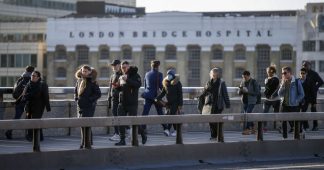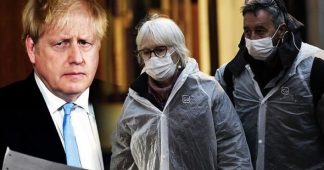Mike Buckley sets out the Government’s strategy towards the COVID-19 outbreak so far and explores why its handling of it already raises much bigger questions about the country’s governance – concerns which have been there all along.
By Mike Buckley
17 March 2020
The UK has wasted seven weeks. This is the judgement of Richard Horton, the editor of The Lancet.
The UK’s new Coronavirus strategy of “suppression” is the course of action recommended by the journal in its first report on the issue on 24 January. It is the strategy followed by China, South Korea, Taiwan and other countries that have seen some success in reducing the rate of infection. It is the strategy recommended by the World Health Organisation (WHO), which it has been clearly stating would be far preferable to the course of action chosen by the UK Government until yesterday.
The Government’s line is that the science has changed, but this is merely an excuse for its own miscalculation and unwillingness to follow the examples or recommendations of others. It is citing a report by Imperial College which clearly sets out the implications of the Prime Minister’s former policy of “mitigation” –allowing the virus to spread in order to create ‘herd immunity’. The report states that this would lead to 250,000 deaths, both from the virus and because people otherwise ill would be denied treatment by an overwhelmed NHS.
But this data was already available. Foreign governments, the WHO, teams of scientists and our own NHS professionals have been arguing for weeks that the Government’s strategy would lead to disaster. We have lost seven weeks which could have been used to order and make ventilators, testing kits and protective gear for medical and care staff. We have lost seven weeks which could have been used to retrain staff and build capacity. We have allowed the Coronavirus to spread for seven weeks when we could have held it back.
Had the UK followed WHO guidelines and the best practice of other states we could have kept infections to a much lower rate. WHO advice is abundantly clear, based on existing guidelines and the experience of countries which have successfully contained and turned back COVID-19 and previous pandemics. The essential elements for success are mass testing, the isolation of the sick and those carrying the virus, contacting and testing people who may have been exposed to it, and social isolation to prevent its spreading by people yet to show symptoms. This is not theory, it is fact.
The experience of Asian countries which lived through Sars, Mers and H1N1 has informed these guidelines and it is no coincidence that countries which learned lessons in the Sars outbreak of 2003 are the same countries which have been most successful in containing the Coronavirus. They have had time to develop systems and structures for the next infection. The only surprise is that Western countries have been so slow to follow their lead and to learn from their former failures and present success.
Taiwan, for example, as of 15 March, had just 59 confirmed cases and one death. It has managed to avoid a major outbreak of a disease which all but paralysed neighbouring China. Apart from most people wearing masks on public transport, life there goes on as usual.
South Korea has tested more than 248,000 people for COVID-19. Drive-through testing is followed by test results within a matter of hours, helping to reduce crowding and contamination exposure at hospitals. Widespread testing means that new infections are caught quickly and the person isolated. Hong Kong’s Government suspended classes, closed most public facilities and told residents to avoid public gatherings when the number of confirmed cases was below 20.
Early travel restrictions, aggressive testing and the screening of contacts and strict quarantine rules have been key. The result is that the infection has been contained in Taiwan and Singapore and that the rate of increase has been slowed or reduced in South Korea, Hong Kong and Japan. Even China – which was slow in its initial response – now has the infection largely under control after 80,000 cases and 3,213 deaths. For the country where the outbreak started, the worst appears to be over – but for the West it is just beginning.
The ‘Herd Immunity’ Mistake
Even now, the UK is still far behind where it needs to be because suppression only works if it is total. Any deviation simply increases infections, devaluing the whole process, endangering lives and putting health services under increased strain. The UK has still not banned public gatherings, closed schools or restricted travel. Other European nations, which were themselves in many cases slow to act in response to the crisis, are now implementing full suppression including lockdowns, closed bars and restaurants, and effective isolation at home for all but key workers.
Meanwhile, the UK is still trying to tread a line between containing the virus and keeping the economy going – a strategy which, if unchanged, will likely be catastrophic both for our health and the economy.
Just as importantly, the UK is not conducting mass testing, which has been a key element of all successful attempts to contain the virus. If we don’t know who has had it, we don’t know who’s immune. If individuals don’t know they have it, they will be careless with others. If we don’t know where an outbreak is located, we cannot quarantine people. Even NHS staff cannot get tested, putting them under increased pressure and leaving them fearful of infecting people by accident or passing the virus on to family members.
The good news is that UK policy is belatedly moving in the right direction. It must now surely be a matter of days before schools are closed, bars and restaurants are forced to shut down and an economic package of support for affected businesses is put together.
But, what this does not address is why our Government chose to ignore available evidence for so long and why it felt that it could choose to go its own way – despite the chorus of expert voices telling it to reconsider and follow international best practice.
Its former strategy was not just ill-judged, it was astoundingly, obviously wrongheaded. The Government publicly stated that it expected 60-80% of the population to get the virus. At 80%, that would be 54 million people and, at a 1% death rate, 540,000 deaths. Although more than 80% of COVID-19 infections are mild, more than six million people would be at risk of severe symptoms. According to a Chinese study of 44,415 confirmed cases, around 5% of people experience critical illness including respiratory failure, septic shock or organ failure.
The Government was right to believe that herd immunity is something to aim for – but neglected to take into account that it has never before been achieved through mass exposure to a disease. It is normally created through vaccination. To attempt to create herd immunity through mass infection for a disease with at least a 1% mortality rate would lead to an unacceptable numbers of deaths, all the more so in a country with a comparatively low number of intensive care beds, ventilators and specialist staff where access to care will be at a premium.
Given that the UK knew that containment is possible from examples in Asia, to choose to go down this path – being aware that tens of thousands of vulnerable and elderly people would die as a result – is abhorrent. What makes the policy even more flawed is that we do not yet know enough about COVID-19 to know that mass infection would equate to mass immunity. It is possible that immunity could only last a few months or that the virus will mutate, as flu does each winter. Thousands could die and the rest of us be no safer next year than we are today.
The Governance Problem
In the short-term, we have to hope that the Government will belatedly implement full suppression to give us time to bring the outbreak under control.
But, more broadly, we have to ask what kind of Government seemingly wilfully ignores international best practice, the guidelines of the major multilateral health organisation and the strong recommendations of experts including scientists and its own health professionals.
For weeks, all of these have been calling for the Government to change its strategy, arguing that it was putting lives at risk and, yet, it carried on regardless. Even now, it has only partially changed its strategy and is still dragging its heels over school closures and forcibly closing bars, restaurants and other gathering places.
The parallels with the Brexit process are there for those who want to see them. In both cases, the Government has ignored the views of experts. On both issues, there is an arrogance and a belief that Boris Johnson and those around him know best – however many times they are told that achieving herd immunity would be a disaster or that a hard Brexit would lead to economic ruin.
In both cases, Johnson and his circle have resorted to obfuscations and lies when their arguments have been under attack. Just at the weekend, the Health Secretary Matt Hancock denied that herd immunity had ever been part of the plan, while the Transport Secretary Grant Shapps said that the “UK is testing more people than any country other than China and Italy”. This is not even close to being true.
Where this leaves us is with Coronavirus policy that is still imperfect. Even when it is tightened up, it will have cost lives due to the time wasted when measures could have been put in place to prevent it spreading and to prepare the NHS for an influx of cases. While our priority now needs to be saving lives, supporting NHS staff and the vulnerable and elderly, we must also begin to think seriously about the governance of the UK. Because if this Government is incapable of listening to expert advice from home and abroad and is making such flawed decisions as a result, we have a serious problem.
In the last decade, austerity wasted opportunity and destroyed much of the public realm. Brexit will do more of the same, only it will cut more deeply and harm areas and communities that are already suffering. Both were political choices made by bad governments. Now, the response to the Coronavirus has again exposed the limitations of governance in this country and why it needs root and branch reform.
Once the Coronavirus is under control, we must begin to plan and agitate for change – our futures depend on it.
Published at https://bylinetimes.com/2020/03/17/the-coronavirus-crisis-mistake-over-herd-immunity-has-cost-us-vital-time/











